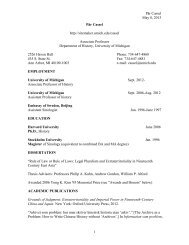Making History Personal: Constantine Cavafy and the Rise of Rome
Making History Personal: Constantine Cavafy and the Rise of Rome
Making History Personal: Constantine Cavafy and the Rise of Rome
Create successful ePaper yourself
Turn your PDF publications into a flip-book with our unique Google optimized e-Paper software.
Frier, “<strong>Making</strong> <strong>History</strong> <strong>Personal</strong>,” page 28<br />
perusing a collection <strong>of</strong> Ptolemaic inscriptions all stuffed with fulsome praise <strong>of</strong> <strong>the</strong> various male<br />
<strong>and</strong> female monarchs, when he happens upon “a tiny, / insignificant reference to King Caesarion<br />
…” This collection probably is, or at least closely resembles, <strong>the</strong> 1897 book by <strong>the</strong> German<br />
scholar Max Lebracht Strack. 95<br />
The epiphany that follows is utterly singular:<br />
Exactly why <strong>the</strong> mention <strong>of</strong> Caesarion catches <strong>Cavafy</strong>’s notice<br />
is unclear, but <strong>of</strong> course he was previously interested in Caesarion; <strong>and</strong> <strong>the</strong> Caesarion inscrip-<br />
tions in Strack’s collection are in fact few in number <strong>and</strong> confined to a single page.<br />
Ah, <strong>the</strong>re: you came with your indefinite<br />
charm. In history <strong>the</strong>re are only a few<br />
lines that can be found concerning you;<br />
<strong>and</strong> so I could fashion you more freely in my mind.<br />
I fashioned you this way: beautiful <strong>and</strong> feeling.<br />
My artistry gives to your face<br />
a beauty that has a dreamy winsomeness.<br />
And so fully did I imagine you<br />
that yesterday, late at night, when <strong>the</strong> lamp<br />
went out—I deliberately let it go out—<br />
I dared to think you came into my room,<br />
it seemed to me you stood before me: as you must have been<br />
in Alex<strong>and</strong>ria after it had been conquered,<br />
pale <strong>and</strong> wearied, perfect in your sorrow,<br />
still hoping <strong>the</strong>y’d have mercy on you,<br />
those vile men—who whispered “Surfeit <strong>of</strong> Caesars.”<br />
This passage moves well beyond <strong>the</strong> “Caesarion all grace <strong>and</strong> beauty” <strong>of</strong> “Alex<strong>and</strong>rian Kings.”<br />
The earlier Caesarion was already largely a product <strong>of</strong> <strong>Cavafy</strong>’s perfervid imagination; but <strong>the</strong>re<br />
<strong>the</strong> emphasis was on dress <strong>and</strong> external elegance, as Caesarion would have been seen by <strong>the</strong><br />
Alex<strong>and</strong>rian crowd. Here it is Caesarion’s imagined face that transfixes <strong>Cavafy</strong>, who has freely<br />
95 Strack, Ptolemäer (1897) 219-275, with Caesarion at 272; although this volume was not in <strong>the</strong> 2004 catalogue,<br />
<strong>Cavafy</strong> may have borrowed it. Compare Mendelsohn, Collected Poems (2009) 405: “Etienne Combe, <strong>the</strong> last<br />
European director <strong>of</strong> <strong>the</strong> library in Alex<strong>and</strong>ria from which <strong>Cavafy</strong> would borrow books, recalled that <strong>the</strong> poet would<br />
borrow collections <strong>of</strong> inscriptions such as those mentioned in this poem.” O<strong>the</strong>r possible sources are scouted by<br />
Pontani, “Fonti” (1940-1941) 61. On <strong>the</strong> poetic technique in this poem, see Dimaras, “Technique” (1983).
















